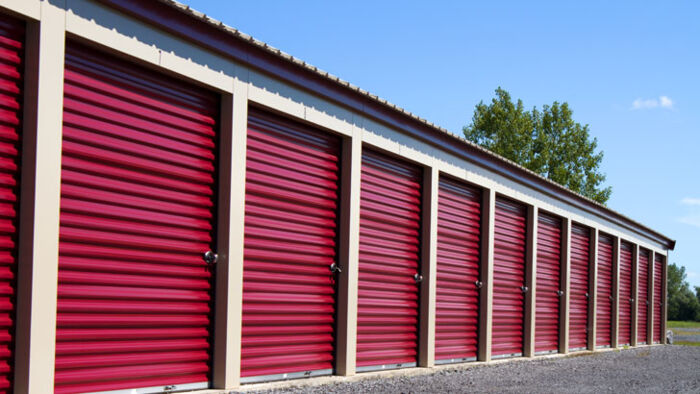Surprising ways you can invest in storage units
By Pam Walkley
Self-storage is one sector of the commercial property market that's booming. A downside is that retail investors who want to jump on the self-storage bandwagon have limited options, but a new kid on the block will increase their access.
The sector proved to be one of the most resilient industries in Australia during the pandemic. As more people worked from home, many needed to declutter to provide more space and some of this "clutter" was moved into self-storage units.
This came on top of the main driver of self-storage: people moving house. There's also been an increase in e-commerce businesses that use storage units to house their inventory. All these factors have combined to drive up occupancy and rental rates.
In contrast to the US and UK, where there are multiple listed self-storage options, including exchange traded funds (ETFs), Australian investors have few options. At the time of writing, National Storage (ASX: NSR) is the only public Australian real estate investment trust (REIT), with 200-plus facilities.
But that is about to change: another REIT, Abacus (ABP), kicked off an equity raising in mid-June for the proposed spin-off of its $3 billion portfolio of Storage King self-storage properties. Abacus Group also holds a $1.9 billion office portfolio and a $490 million
retail portfolio.
Abacus hopes to raise at least $225 million (through a pro-rata offer to existing shareholders for the self-storage demerger. It has valued the assets for its Storage King REIT (ASK) at $2.6 billion. It's scheduled to list in August.
As a standalone trust, it will comprise a $3 billion portfolio of 112 trading self-storage facilities and 23 future facilities, and the Storage King operating platform valued at $100 million.
Office values fall
The Abacus Storage King REIT is forecast to generate funds from operations - the equivalent of operating earnings - of 6.3 cents per security in the 2024 financial year, of which 6 cents per security will be paid out in distributions.
For Abacus (which will retain a 19.9% stake in the trust and generate fee income as its manager), the move into self-storage has become more attractive as office values are falling due to higher vacancy rates - partly sparked by a reluctance of workers to return to the office - and funding costs.
By comparison, the performance of self-storage assets has soared on strong demand and high occupancy rates.
"The self-storage market has attractive market fundamentals supported by macroeconomic tailwinds, including an imbalance in supply and demand for self-storage space, densification of residential property, and the growth of e-commerce," said Abacus managing director Steven Sewell when the de-stapling was proposed in February.
Its established competitor, National Storage, floated in 2013 and owns and operates 231 centres in Australia and New Zealand, providing storage solutions to more than 90,000 residential and commercial customers. Current market capitalisation is $3.1 billion.
For the half-year ended December 31, 2022, National Storage's total revenue increased by 23% to $162.5 million (compared with $131.6 million at December 31, 2021) driven by strong self-storage revenue growth, increases in rate per square metre and an increase to total net lettable area through completion of developments and acquisitions, according to the company's interim report.
It declared an interim distribution of 5.5 cents per stapled security at December 22 (4.6 cents in December 2021) on the back of underlying earnings per share (EPS) of 6 cents per stabled security, up 22.4% compared with December 21.
In June, NRS said it expects underlying earnings to be 11.5 cents a share for the 2022-23 year, reflecting an increase of 8.5% on 2021-22. Good news for investors is that NSR has a policy to distribute 90%-100% of underlying earnings. It pays investors distributions twice yearly and the current dividend yield is 4.6%.
Strong investor appetite
Highlighting investor appetite for the self-storage sector in contrast to other listed commercial property, National Storage successfully completed a $300 million equity raising in March and has subsequently raised $600 million in new debt funding to drive its expansion.
National Storage has the largest market share (18%), followed by Storage King (14%) and Kennards (12%), shows the Self Storage Association of Australia's 2022 industry report. In its December 22 half yearly report, NSR revealed it had a pipeline of 46 projects, including expansions and redevelopments. It plans to continue acquiring and developing self-storage centres, consolidating the fragmented industry, as well generating organic growth through dynamic pricing and occupancy management.
Investors can get a stake in NSR with as little as $500 and be able to invest in ASK when it's listed with the same outlay.
Go your own way
The other main way investors can invest in self-storage is to buy an individual unit. While these might not seem exciting, you can get into the market for around $150,000 (even less in some instances), earn a net yield of around 7% and enjoy a relatively hassle-free set-and- forget investment. For example, these units require much less maintenance than a house or apartment.
As with most real estate, location is an important consideration if you are looking to invest in a storage unit. Look for those close to major population centres and with good access.
Preferably your unit should be in a convenient location to appeal to the two strong tenant pools:
- Consumers struggling for enough space for their stuff, especially given the twin moves to apartment living and working from home.
- Businesses that require storage space to stockpile products, office furniture and even vehicles.
Newer self-storage complexes are usually high-tech. Many are multi-level with ventilation control, passenger lifts, fire safety and greater security that includes cloud-based gate access and video surveillance. Most are leased on 12-month terms.
For example, Urbanbox, a high-security strata storage facility at Kogarah in south-west Sydney, comprises 205 units in a variety of sizes over three levels. It boasts 42 infrared motion detector cameras and 24/7 back-to-base security. An 18 sq m unit in the complex is available for sale (at the time of writing) with an asking price of $135,000 through agents Brookes Partners. Details are available on realcommercial.com.
Another example is SmartSpace, at Penrith, west of Sydney. Here a 30 sq m strata storage unit is for sale for $155,000 plus GST, with an estimated return of 7% net. This relatively new two-level facility provides high clearances of over 4.5 metres, mezzanine levels in every unit and 24-hour CCTV security. Details are available on realcommercial.com.
Get stories like this in our newsletters.



